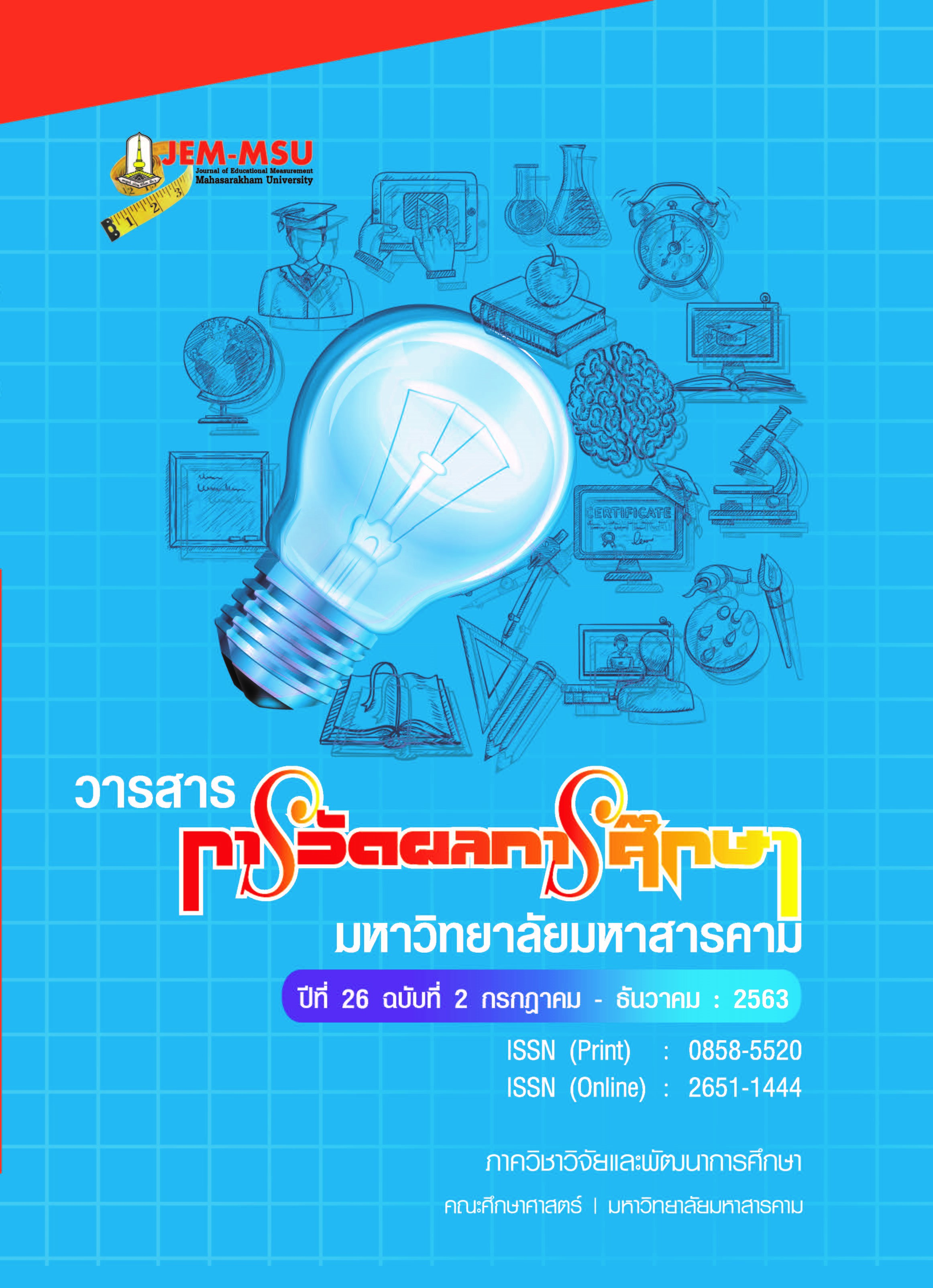Development Indicators of Growtg Mindset for Sixth Grade Student
Main Article Content
Abstract
The objectives of this research were: 1) to develop indicators of growth mindset for sixth grade students; 2) to validate the growth mindset indicators model for sixth grade students that the author had constructed with empirical evidence. The sample comprised 982 students. The research instrument was a growth mindset measurement form for sixth grade students.
The results were as follows:
1. The growth mindset for sixth grade students consisted of 7 factors with 16 indicators. They were: 1. like for challenges, with the following indicators: accepting risks, perceiving challenges as opportunities for learning, and learning new things; 2. perseverance in learning, with the following indicators: committed to learning, using effort; 3. problem confronting, with the following indicators: committed to solving problems and obstacles, analyzing the causes of failure, committed to correcting mistakes; 4. learning from criticism, with the following indicators: listening to criticism, improving and developing; 5. intellectual potential developing abilities, with the following indicators: development of the learning potential of the brain, development of one’s own potential of thinking; 6. learning and inspiring by other’s achievements, with the following indicators: seeking and learning from success of others, application of experience and success of others; and 7. expression and responsibility in self-learning, with the following indicators: continuous learning and self-development, responsibility for learning.
2. The growth mindset indicator model for sixth grade students was found to fit the empirical data (Chi-Square= 213, df = 82, P-value = 0.5667, CFI = 1.000 TLI = 1.002 RMSEA = 0.017, SRMR = 0.021 และ Chi-Square/ df = 0.966).
Article Details
The content and information contained in the published article in the Journal of Educational Measurement Mahasarakham University represent the opinions and responsibilities of the authors directly. The editorial board of the journal is not necessarily in agreement with or responsible for any of the content.
The articles, data, content, images, etc. that have been published in the Journal of Educational Measurement Mahasarakham University are copyrighted by the journal. If any individual or organization wishes to reproduce or perform any actions involving the entirety or any part of the content, they must obtain written permission from the Journal of Educational Measurement Mahasarakham University.
References
เกรียงศักดิ์ เจริญวงศ์ศักดิ์. (2546). การคิดเชิงวิเคราะห์. กรุงเทพฯ : ซัคเซสมีเดีย.
ชนิตา รุ่งเรืองและคณะ. (2559). กรอบความคิดเติบโต: แนวทางใหม่แห่งการพัฒนาศักยภาพมนุษย์. วารสารวิทยาการวิจัยและวิทยาการปัญญา: มหาวิทยาลัยบูรพา, 32(2), 171–175.
ทัศนีย์ ลักขณาภิชนชัช และคณะ (2550). รายงานการศึกษาวิจัยเรื่อง การพิทักษ์ ปกป้องคุ้มครองสิทธิเด็กและ เยาวชนที่กระทำผิดตามอนุสัญญาและมาตรฐานระหว่างประเทศ. กรุงเทพฯ: สำนักงานกิจการยุติธรรมกรรมพินิจและคุ้มครองเด็กและเยาวชน กระทรวงยุติธรรม.
ทิศนา แขมมณี. (2545). ชุดกิจกรรมการเรียนการสอนและฝึกกระบวนการกลุ่ม ชั้นประถมศึกษาปีที่ 6.กรุงเทพฯ: ภาควิชาประถมศึกษา คณะครุศาสตร์, จุฬาลงกรณ์มหาวิทยาลัย.
ธนะดี สุริยะจันทร์หอม. (2561). การพัฒนารูปแบบการเสริมสร้างโกรว์ธมายด์เซตสำหรับนักศึกษาหลักสูตร วิชาชีพครู. ปรัชญาดุษฎีบัณฑิต สาขาวิชาจิตวิทยาการศึกษาและการแนะแนว คณะศึกษาศาสตร์ มหาวิทยาลัยมหาสารคาม มหาสารคาม.
พัชราวลัย มีทรัพย์. (2556). โครงสร้างการคิดของนักเรียนชั้นประถมศึกษา. วารสารวิจัย มสด. สาขาสังคมศาสตร์และมนุษศาสตร์, 9(2),159-185.
ศุภมิต ศิริโสภณภิวัฒน์. (2560). การพัฒนารูปแบบเพื่อเสริมสร้างค่านิยมด้านความรับผิดชอบของนักเรียนระดับชั้นประถมศึกษาปีที่ 5, วารสารราชพฤกษ์, 15(3), 36-45.
ศูนย์จิตวิทยาการศึกษา. (2561). กรอบความคิดแบบเติบโต“รักเรียนรู้ และชอบความท้าทาย”. [ออนไลน์]. ได้จาก : http://leader.innoobec.com/wp-content/uploads/2016/02/Mindset-Book-Final_11JUN2015.compressed.pdf. [สืบค้นเมื่อ วันที่ 4 สิงหาคม 2562].
สำนักงานคณะกรรมการการศึกษาแห่งชาติ กระทรวงศึกษาธิการ. (2551) หลักสูตรแกนกลางการศึกษาขั้นพื้นฐาน พุทธศักราช 2551. กรุงทพฯ: โรงพิมพ์คุรุสภาลาดพร้าว.
อภิญญา อิงอาจ และ ชลธร อริยปิติพันธ์. (2553). การรับรู้ความสามารถของตนด้านการเรียนและความสามารถในการฟันฝ่าอุปสรรคของนักศึกษาคณะวิทยาศาสตร์และเทคโนโลยีมหาวิทยาลัยกรุงเทพ, วารสารวิชาการมหาวิทยาลัยกรุงเทพ, 9(1), 30-43.
Aronson, J. (2002). Reducing The Effects of Stereotype Threaten African American College Students by Shaping Theories of Intelligence. Journal of Experimental Social Psychology, 38(1) : 113-125.
Bloom , B.S. (1971). Handbook on Formative and Summative Evaluation of Student Learning. New York : McGraw-Hill.
Dweck, C.S. (2000). Self-Theories: Their Role in Motivation, Personality, and Development. NewYork: Random House.
Dweck, C.S. (2006). Mindset : The new psychology of success. New York: Random House.
James N. Johnstone. (1981). Indicators of Education Systems. In London : The Ancher Press.
Kolb and Fry. (1975). Organizational learning : The contributing processes and literatures. in Cohen, M. D., & Sproull L. S.
Weir, John Joseph. (1974). Problem Solving is Every Bodyus . Science Teacher, (4),16-18; April.


